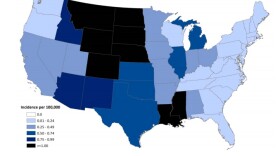While most Americans probably haven't heard of Chikungunya, Ann Powers, a research microbiologist at the Centers for Disease Control, has been studying the virus for 15 years.
The mosquito-carried virus made the news recently when the first locally-transmitted case of it appeared in Florida, July 17. Now, the public and medical researchers are wondering if it may spread further into the United States, and how serious it might be.
The research that Powers does at the CDC's Division of Vector Borne Diseases in Fort Collins may help answer some of those questions.
"One of the things we're looking at pretty extensively right now is what mosquito species in the United States would actually be susceptible to the virus and how would they transmit it," said Powers.
The Chikungunya virus, which originated in Africa, is now widespread -- an outbreak affected the Caribbean in 2013, and most cases of Americans infected with the disease have come from those who caught it there. Although it is rarely fatal, Chikungunya causes severe, debilitating joint pain and fever. It typically lasts a few days to a week, but can last much longer.
Scientists know that two species of mosquito, Aedes aegypti and Aedes albopictus, spread the virus, after biting an infected person. Some of the research Powers has done helps scientists understand how easily mosquitoes get infected, which helps them know how easily the virus might spread.
A Lab Of Biting Insects
Powers’ Fort Collins laboratory is full of groups of the two mosquito species, collected from different parts of the country. There, researchers infect the mosquitoes, and track the virus as it moves through their bodies.

"We can actually dissect the mosquitoes and see whether the virus is limited to the gut tissue or if it has disseminated and moved to the salivary glands, because when it reaches the salivary glands, that's when it's able to transmit," she said.
Thus far, the researchers have found that most of the U.S. populations of mosquitoes are very susceptible to the disease, meaning they get infected easily – good news for the virus, bad news for those who don't want it to spread.
Powers has also worked on developing a vaccine for the disease, which to date has no vaccine or treatment. There is precedent for work on a vaccine: Two other mosquito-borne viruses, yellow fever and Japanese encephalitis, have one.
She said there are a number of promising vaccines in development, but getting them into the advanced clinical trial stage is hard. That's because such trials are expensive, and companies that would fund them are not sure if there would be a big market for the vaccine.
"If there isn't sufficient revenue that is going to come out of it eventually, then there is less interest in moving a product forward."
Scientists Hope Disease Won't Spread Far
Now that two people in Florida have been infected, likely by local mosquitoes, there is an open question of how far the disease might spread, and how severe it might be. The mosquitoes that can transmit the disease currently range through about a third of the U.S., primarily in the South, but extending up to the Mid-Atlantic and lower Midwest, Texas and California.

One factor that may limit Chikungunya's spread is that it is only spread between humans and mosquitoes, unlike West Nile, which can live in birds and other animals, said Stephen Higgs, director of Kansas State University's Biosecurity Research Institute.
So like dengue fever, which has also been found in Florida, if people keep from getting bitten, that can keep the virus from spreading.
"Although we have seen dengue in the United States, including in Florida, it has been relatively limited. They've implemented mosquito control and educated the people and told the people what to do to avoid being bitten," said Higgs.
Higgs said it was likely the U.S. will see more cases this summer, while people are outside.
As to how the new virus will play out across the United States, he said that it is hard to forecast.
"The thing that I saw when West Nile came in to the U.S. is that nobody should make predictions," he said.







